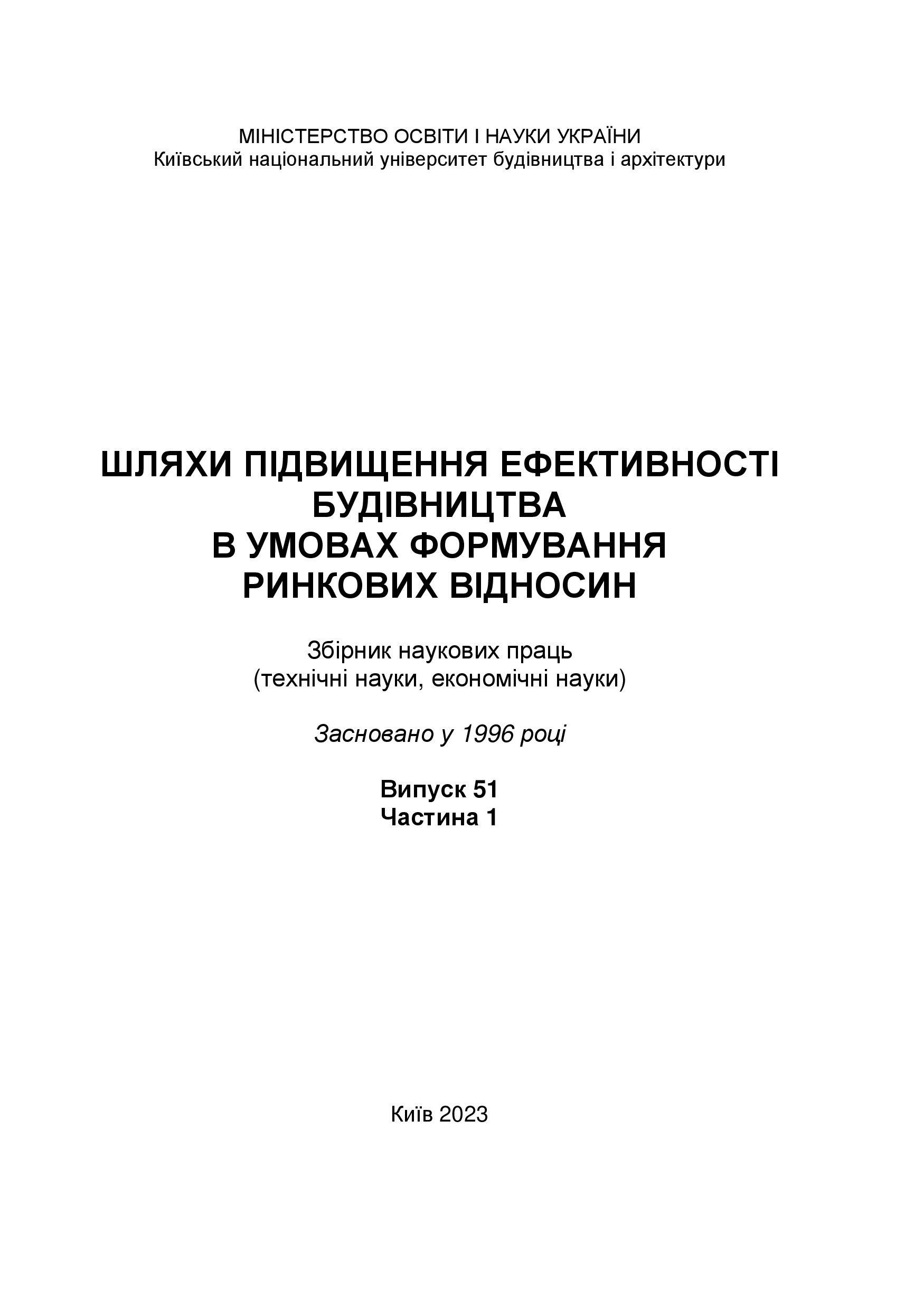Optimization and control of the work program in the financial management subsystem of the construction organization
DOI:
https://doi.org/10.32347/2707-501x.2023.51(1).129-142Keywords:
construction organization, financial management, budget optimization, financial control, productivity, monitoring, reporting, cost estimationAbstract
In the dynamic world of construction, financial management plays a key role in the success and sustainability of the company. Effective financial management ensures that a construction company can complete projects on time, maintain profitability and withstand economic fluctuations. Effective budgeting and cost control ensure projects stay on schedule, reducing the risk of cost overruns and delays. It also enables better decision-making because project managers can identify areas where savings can be implemented without compromising quality.
Management of work programs of a construction enterprise from the point of view of financial management should include a balance between detailed regulation of their branch functions in order to increase productivity and improve the quality of construction works and materials and price. This will contribute to the achievement of socio-economic and technical tasks in the general development of Ukraine. To ensure the sustainable development of the construction organization, it is necessary to reorient the existing systems and determine the priority areas of management. The role of construction organizations in achieving strategic social goals depends on the implementation of investment plans and the final results achieved through their implementation. At the same time, it is important to increase the productivity of the construction complex by rationally using investment resources and directing them to projects that provide maximum economic and social impact, as well as high profitability of completed projects.
In Ukraine, the development of investment and construction complexes takes place in conditions of fierce competition and low investment activity. In the context of post-war recovery, market demands for technical and economic aspects of construction are growing. Construction objects require various optimization approaches and financial control, which makes the issue of financial management of construction organizations quite relevant, as those investments that are available must be able to be used correctly. This article examines the main components of financial management in the construction industry with an emphasis on budget optimization and its financial control.
References
Отенко І. П., Комарков Д. В., Шкребень Р. П. Організація фінансово економічної безпеки бізнес процесів інноваційного розвитку підприємства, Бізнес Інформ. 2017. № 10. С. 144-149.
Отенко І. П., Шкребень Р. П., Харнам М. В. Формування концептуальної моделі управління фінансово-економічною безпекою бізнес-процесів підприємства. Бізнес Інформ. 2020. №12. C. 423–429.
Ложачевська О. М., Сафонова В. Є., Гнатенко І. А., Навроцька Т. А. Управління інноваційною економікою: стратегічні підходи до бізнес-процесів, кадрового менеджменту та конкурентоспроможності. Агросвіт. 2021. № 15. С. 14–19.
Ареф’єва О.В., Побережна З.М. Стратегічне управління інноваційнітю бізнес-процесів підприємства на конкурентних ринках. Бізнес Інформ. 2019. № 11. С.108-116.
Камінська Т.Г., Шатковська Л.С., Шиш А.М., Дробот Н.М., Ільчак О.В. Обліково-аналітичне забезпечення фінансового менеджменту в підприємствах. Монографія. К.: ЦП «Компринт», 2013. 338 с.
Бруханський Р. Ф. Система стратегічного фінансового обліку: аналіз сучасного стану і перспективи розвитку. Бізнес Інформ. 2014. 7. С. 221-231.
Лівінський О.М. та ін. Менеджмент якості в будівництві та виробничі організаційні системи: монографія. Київ: ЦУЛ, 2018. 230 с.
Птащенко Л., Сержатов В. Фінансовий контролінг, навч. посіб. 2021, 344 с.
Савенко В., Лівінський О. та ін. Менеджмент якості в будівництві і геном ділової досконалізації організації», монографія, 2020. 128 с.
Окландер Т., Петько І. Економіка будівельного підприємства: підручник. К. : Центр учбової літератури, 2018. 363 с.
Хігні Джосеф. Основи управління проектами Харків : Фабула, 2020. 272 с.
Ізмайлова К.В. Фінансовий аналіз у будівництві. Навчальний посібник. Київ. "Кондор". 236 с
Стеценко С. П., Сорокіна Л. В., Ізмайлова, К. В. Фінансовий аналіз та економічна діагностика: навч. посіб. Київ: КНУБА. 2019. 320 с.
Шекснайдер К.Дж., Мейо Р., Оберлендер Ф. Принципи будівництва та управління проектами», 2008, 352 с.
Fabozzi F., Peterson P. Financial Management and Analysis. Second Edition. John Wiley & Sons, Inc., 2003. 1022 p
Тугай А.М., Шилов Е.Й., Гойко А.Ф. Економіка будівельної організації: К.: Міленіум, 2002. 224 с.
Рогожин П.С., Гойко А.Ф. Економіка будівельних організацій. К.: Видавничий дім «Скарби», 2001. 448 с.
Гойко А.Ф., Ізмайлова К.В., Куліков П.М. Економіка будівництва: навч. посібник. К.: КНУБА. 2013. 139 с.
Лівінський О. М. та ін. Економіка будівництва: навч. посіб. Укр. акад. наук. Київ : Людмила, 2019. 219 с.
Рижакова Г. М. (2017). Економетричний інструментарій управління фінансовою безпекою підприємств будівництва. монографія] /; за наук. ред. проф. Сорокіної ЛВ, Гойка АФ. Київ: КНУБА, 373-398.
Ізмайлова К. В. Фінанси підприємств: конспект лекцій. Київ: КНУБА. 2020. 156 с.
Ізмайлова К.В. Финансовый анализ. К.: ЦУЛ, 2000. 148 с.
Савенко В.І. та ін. Конкурентоспроможність будівельної організації – основа виживання економіки: монографія. Київ: ЦУЛ, 2017. 128 с.
Економіка будівельного підприємства: навчальний посібник /С.П.Стеценко та інш. К.:Ліра-К, 2022. 508 С.
Downloads
Published
How to Cite
Issue
Section
License

This work is licensed under a Creative Commons Attribution 4.0 International License.
Authors who publish with this journal agree to the following terms:
- Authors retain copyright and grant the journal right of first publication with the work simultaneously licensed under a Creative Commons Attribution License that allows others to share the work with an acknowledgement of the work's authorship and initial publication in this journal.
- Authors are able to enter into separate, additional contractual arrangements for the non-exclusive distribution of the journal's published version of the work (e.g., post it to an institutional repository or publish it in a book), with an acknowledgement of its initial publication in this journal.
- Authors are permitted and encouraged to post their work online (e.g., in institutional repositories or on their website) prior to and during the submission process, as it can lead to productive exchanges, as well as earlier and greater citation of published work (See The Effect of Open Access).

